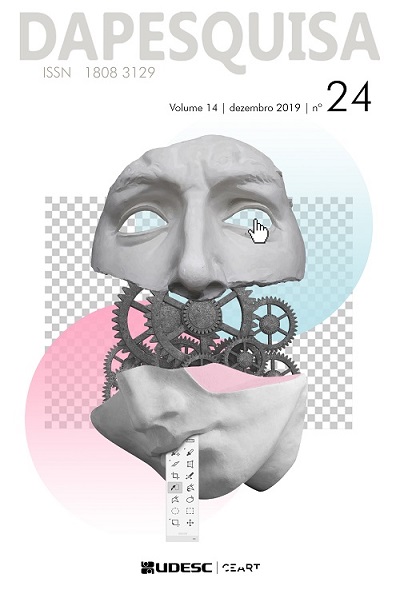Leis artificiais de inversão e leis naturais de desenvolvimento: revisando uma oposição que permeia o Harmonielehre de Schenker
DOI:
https://doi.org/10.5965/1808312914242019068Keywords:
Teoria musical, Análise musical, Harmonia tonal, Conceitos schenkerianosAbstract
Observando que o Tratado de Harmonia de Heinrich Schenker (1906) articula um conjunto de pares opositores do tipo teórico/prático, geral/particular, diatônico/cromático, fixo/variável etc., o presente artigo propõe uma revisão acerca de uma polarização específica que, na terminologia de Schenker, se distingue como inversão (Inversion) e desenvolvimento (Entwicklung). Pondera-se que, caracterizadas como leis, as forças artificiais de inversão e os movimentos naturais de desenvolvimento, com diversas implicações técnicas e especulativas, são dadas como princípios contrários que, por meio da vontade instintiva e engenhosa, se misturam e se complementam visando a variedade necessária para a qualificação artística da composição tonal.
Downloads
References
ABDOUNUR, Oscar João. Matemática e música. São Paulo: Escrituras Ed., 1999.
BARBOZA, Jair. Infinitude subjetiva e estética: natureza e arte em Schelling e Schopenhauer. São Paulo: SciELO: Ed. UNESP, 2005.
BARCE, Ramon. Prólogo. In: SCHENKER, Heinrich. Tratado de armonia. Madrid: Real Musical, 1990.
BARROS, Guilherme Antonio Sauerbronn de. Mahle, Steiner, Goethe: um estudo do conceito de harmonia. Curitiba: Ed. Prismas, 2015.
BATTEUX, Charles. As belas-artes reduzidas a um mesmo princípio. In: LICHTENSTEIN, Jacqueline (Org.). A pintura: o belo. São Paulo: Ed. 34, 2004. v. 4, p. 69-75.
BROWN, Matthew. Explaining tonality: schenkerian theory and beyond. Rochester: University of Rochester Press, 2005.
COOK, Nicholas. The Schenker project: culture, race, and music theory in fin-de-siècle Vienna. Oxford: Oxford University Press, 2007.
DAHLHAUS, Carl. Studies in the origin of harmonic tonality. Oxford: Princeton Univ. Press, 1990.
DAMSCHRODER, David. Thinking about harmony: historical perspectives on analysis. Cambridge University Press, 2008.
DUDEQUE, Norton Eloy. Sobre o Harmonia de Arnold Schoenberg. Per Musi, Belo Horizonte, v. 9, p. 114-123, 2004.
FREITAS, Sérgio Paulo Ribeiro de. Que acorde ponho aqui? Harmonia, práticas teóricas e o estudo de planos tonais em música popular. 2010. Tese (Doutorado em Música) – Instituto de Artes, Universidade Estadual de Campinas, Campinas, 2010. Disponível em: http://repositorio.unicamp.br/jspui/handle/REPOSIP/284967. Acesso em: 01 nov. 2019.
GIANNOTTI, Marco. Análise dos principais elementos da Doutrina das Cores. In: GOETHE, Johann Wolfgang von. Doutrina das cores. São Paulo: Nova Alexandria, 2011. p. 173-183.
GOETHE, Johann Wolfgang von. A metamorfose das plantas. Lisboa, Imprensa Nacional da Casa da Moeda, 1997.
HARRISON, Daniel. Harmonic function in chromatic music: a renewed dualist theory and an account of its precedents. Chicago, University of Chicago Press, 1994.
HELMHOLTZ, Hermann von. On the sensations of tone as a physiological basis for the theory of music. London: Longmans, Green, And Co. 1895.
KESTLER, Izabela Maria Furtado. Johann Wolfgang von Goethe: arte e natureza, poesia e ciência. História, Ciências, Saúde-Manguinhos. Rio de Janeiro, v. 13, Supl., p. 39-54, out. 2006. Disponível em: http://www.scielo.br/pdf/hcsm/v13s0/02.pdf. Acesso em: 01 nov. 2019.
KLUMPENHOUWER, Henry. Dualist tonal space transformation in nineteenth-century musical thought. In: CHRISTENSEN, Thomas (ed.). The Cambridge history of western music theory. Cambridge: Cambridge University Press, 2006. p. 456-476.
MENEZES, Flo. A acústica musical em palavras e sons. São Paulo: Ateliê Editorial, 2003.
MONTESQUIEU, Charles. O gosto. São Paulo: Iluminuras, 2005.
MORGAN, Robert P. Becoming Heinrich Schenker: music theory and ideology. Cambridge Univ. Press, 2018.
PASTILLE, Willian. Music and Morphology: Goethe’s influence on Schenker’s Thought. In: SIEGEL, Heidi (ed.). Schenker studies. Cambridge University Press, 1990. p. 29-44.
SCHENKER DOCUMENTS ONLINE. Hugo Riemann. London: Department of Digital Humanities; King's College London, [201-]. Disponível em: http://www.schenkerdocumentsonline.org/profiles/person/entity-000712.html. Acesso em: 01 nov. 2019.
SCHENKER, Heinrich. Harmonielehre. Stuttgart: J.G. Cotta, 1906.
SCHENKER, Heinrich. Tratado de armonia. Madrid: Real Musical, 1990.
SCHENKER, Heinrich. Harmony. Chicago: University of Chicago Press, 1980.
SCHOENBERG, Arnold. Harmonia. São Paulo: Ed. da Unesp, 2001.
SCHUBACK, Márcia Sá Cavalcante. A doutrina dos sons de Goethe a caminho da música nova de Webern. Rio de Janeiro: Ed. URFJ, 1999.
TATARKIEWICZ, Władysław. Historia de la estética. Madrid: Ed. Akal, 1991. v. 3.
TOMÁS, Lia Vera. Música e filosofia, estética musical. São Paulo: Irmãos Vitale, 2005.
WASON, Robert W. Viennese harmonic theory from Albrechtsberger to Schenker and Schoenberg. Rochester: University of Rochester Press, 1995.
WIENPAHL, Robert W. Zarlino, the Senario, and tonality. Journal of the American Musicological Society, v. 12, n. 1, p. 27-41, 1959.
Published
How to Cite
Issue
Section
License
Copyright (c) 2019 Djalma Bianco Cordeiro, Sergio Paulo Ribeiro de Freitas

This work is licensed under a Creative Commons Attribution 4.0 International License.
Authors who publish in this journal agree to the following terms:
The authors retain the copyright and grant the journal the right of first publication, with the study being simultaneously licensed under the Creative Commons Attribution-Noncommercial License, which allows the sharing of work with acknowledgment of authorship and initial publication in this journal.
This journal, following the recommendations of the Open Access movement, provides public access to all its content, following the principle that free access to research leads to a greater global exchange of knowledge.
Plagiarism in all its forms constitutes unethical publication behavior and is unacceptable. The Journal DAPesquisa reserves the right to use software or other methods of detecting plagiarism to analyze submitted works.





